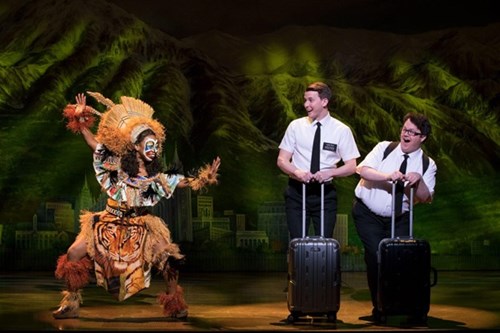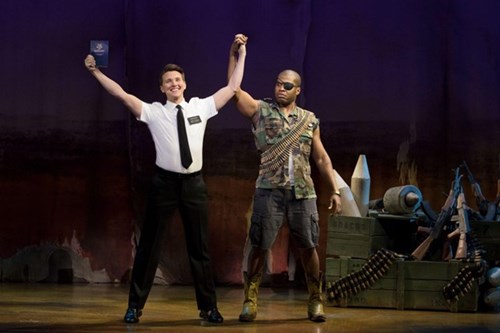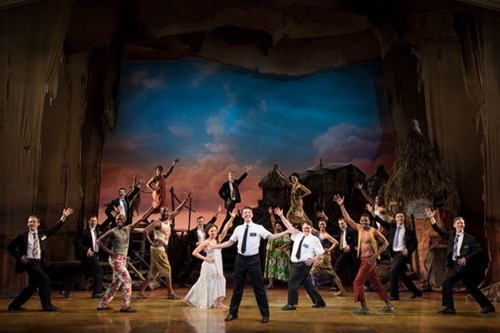
In the rich, eclectic universe of Broadway, The Book of Mormon has solidified its place as one of the most audacious and influential productions. Deftly flying under the flag of controversial comedy, it tells the tale of two naïve Mormon missionaries sent to a remote village in Uganda, delivered with a humorous concoction of satire, crude jokes, and a healthy serving of existential absurdity.
As outrageous as it may seem on the surface, the artistry of The Book of Mormon lies in its ability to dance on the thin line of humor and discomfort, pushing the boundaries of what is considered appropriate for stage comedy. It masterfully takes the controversial elements in our society, shapes them into comedy, and delivers with pinpoint accuracy to challenge preconceived notions and uphold the mirror to audience members with a bold grin.
The show brings to light significant issues such as religion, race, and cultural ignorance in the form of absurd comedy—a sub-genre that cranks up the volume on reality, amplifying it to exaggerated extremes to induce laughter and thought. As some might shy away from such daringly bold content, it begs the question: How has the Broadway audience come to accept and support the controversial comedy that The Book of Mormon presents?
Over the years, Broadway has been the incubator for many shows that dare to dazzle with their audacious content. Far from shunning these productions, Broadway audiences often embrace them, illuminating their eagerness to engage with provocative and challenging themes. Take, for instance, the way in which audiences have continuously flocked to shows like Cabaret, a stark and unabashed depiction of the louche underbelly of Berlin just before the rise of Nazism. Or consider Urinetown, a satirical comedy musical that provides a scathing critique of capitalism, social irresponsibility, and populism, all wrapped up with a sardonic edge.
The Full Monty, another Broadway hit, ventured into the territory of working-class masculinity and body consciousness while providing the audience with plenty of comedic relief. Meanwhile, Avenue Q is a practical masterclass in the use of raunchy humor and blunt honesty to tackle life's harsh realities. With songs like "Everyone's A Little Bit Racist" and "It Sucks to Be Me," the show employs seemingly offensive humor to engage audiences in an earnest conversation about racism, sexuality, and discovering oneself.
The stage provides a unique environment for the delivery of controversial content. Its versatility lies in the capacity to go beyond words and employ a kaleidoscope of dramatic techniques, from staging and costume design to sound and lighting, to provoke public thought and dialogue.
Theatre, being a live medium, inherently captivates audiences by creating an environment where the sparks of immediacy and unpredictability fly. This makes it an ideal platform to explore complex and uncomfortable topics in a way that can be mediated and controlled yet real and connected. When the lights dim and the curtain rises, audiences are invited into a shared space where performers and spectators come together to collectively explore the human condition, warts and all. There lies the power to offend, provoke, incite laughter, and challenge the status quo without risking the loss of the engagement of the audience.
Moreover, the musical format of The Book of Mormon further enhances the delivery of its edgy content. Music has the remarkable ability to soften the blow of controversial humor, wrapping sharp social commentary in catchy, toe-tapping tunes that stay with audiences well after the curtain falls. The effectiveness of this method truly shines in the musical, where outrageous lyrics are presented in harmonious melodies, giving it a humorous and digestible coating. So, while the musical might poke fun at topics such as religion and cultural ignorance, the score simultaneously uplifts, touching on universally acknowledged human experiences.
Given that Trey Parker and Matt Stone, the creators of the hit show South Park, are also the masterminds behind The Book of Mormon, it’s not surprising to discover many parallels between the two. South Park has become a titan of animated television, renowned (and occasionally reviled) for its brazen humor, irreverent social commentary, and unapologetic satire of American culture and politics. The Book of Mormon shares these traits and even amplifies them in the context of musical theatre.

South Park has regularly made use of musical elements to amplify its satire. Many fans of the show will remember the iconic "La Resistance" song from the movie South Park: Bigger, Longer, and Uncut, or Chef's silky-voiced song interludes, all of which inject an additional layer of tongue and cheek to the satirical narrative. This not only underscores the creator's love for musical-era soundtracks but also hints at the musical strength they would later bring to Broadway with The Book of Mormon.
While both South Park and The Book of Mormon use humor to push the envelope, it's the combination of this audacious humor with music that boosts the effectiveness of their satire and social commentary. While the melodic tunes draw listeners in, the lyrics deliver potent messages, pushing audiences to think critically about the issues being presented. Songs such as "Hasa Diga Eebowai," which may initially seem shocking, perfectly encapsulate the audacious style shared by both South Park and The Book of Mormon. Loaded with satire, the song parodies the quintessential cheerful Disney-esque tune by contrasting it with the harsh reality of life in a struggling Ugandan village. Not shy in its controversial deliveries, the song also carries an insightful undertone regarding the nature of despair and hope.
The Book of Mormon is a triumph on Broadway for a multitude of reasons, the first being its skillful use of satire to critique religious dogma and societal issues. The show balances delicate issues such as faith and belief with humor, forcing audiences to question and reflect upon their own biases and dogmas. While potentially controversial, this satirical critique is deftly handled, as the show encourages laughter not just at the expense of these beliefs but also at the absurdity of taking such beliefs to extremes.
Indeed, the absurdity that permeates through The Book of Mormon forms the backbone of its comedic appeal. It takes situations that are objectively wild, uncomfortable, or plain bizarre and presents them with a tone of light-heartedness. This distortion of reality paints a world where ridiculousness is the status quo, effectively unabating the keen social commentary masquerading beneath the humor.
The success of controversial comedies on Broadway largely lies in their fearless disposition to openly confront unspoken societal norms. It unabashedly brings to the forefront the uncomfortable truths and cultural ignorances that society usually tip-toes around, compelling audiences to not only reflect on these issues but also to take part in a broader discourse about them. The fact that this is achieved through laughter makes the pill easier to swallow - a tricky balance that The Book of Mormon manages to strike gracefully. It thrives off twisting the audience's expectations, catching them off-guard for both comedic effect and deeper social insight.

Having won 9 Tony® Awards, including 'Best Musical,' the show has gone on to enjoy a long run in the Broadway circuit, in addition to international productions and national tours. All things considered, it's clear that this show works on Broadway because it doesn't just flirt with controversy—it embraces it with open arms. It leverages the power of absurd comedy, satirical narrative, and a provocatively challenging script to make audiences laugh, but also to get them to think, question, and engage in a way that only the best of Broadway can achieve.
Musicals, by their very nature, push boundaries. They challenge our perspectives, create new narratives, and provoke thought. With breathtaking choreography, electrifyingly bold performances, and mesmerizing music, they unravel complex stories in a way that's both evocative and entertaining. This unique blend of storytelling and musicality allows shows like The Book of Mormon to boldly approach subjects otherwise considered taboo and encourages audiences to engage in meaningful, sometimes uncomfortable, conversations.
To experience this joyous blend of satire, music, and elation live, broaden your horizons, and treat yourself to The Book of Mormon on Broadway. This production never fails to engage the audience in a wild ride of laughter and reflection. The journey through its controversial comedy is a reminder of how theatre can make us laugh, think hard, and elevate our spirit—all in a single evening.